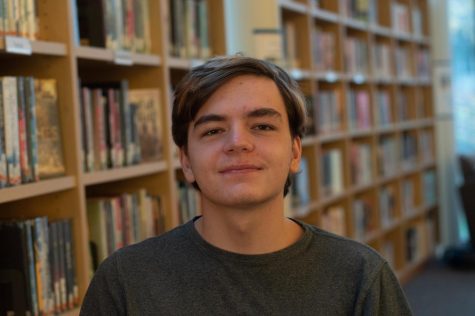Self-Hatred, Autism, and Discrimination: How I Left My Feeling of Inferiority at the Door
Integration can be hard, but that’s nothing to be ashamed of.
March 11, 2020
A cold September gust of wind stretched across the asphalt landscape, slapping against my face and worsening the bubbling anxiety already growing in the pit of my stomach. Pensively walking towards the designated line for second graders, I anxiously waited for the whistle to boom and the first day at my new school to begin. This class was much different than the others I had taken though, with changes far beyond an altered environment.
This was the first day I would partake in mainstream American education.
Before St. Rose, the school I was now attending, most of the people in my class didn’t speak English fluently. Most of them, as a matter of fact, didn’t speak any languages at all.
They couldn’t.
Prior to St. Rose, I was attending a class for those with neurological or mental disorders, while occasionally spending time with ‘normal’ kids, since I was recognized as someone who could potentially move on to greater things.
Asperger Syndrome (AS) is a neurological disorder that, according to the Diagnostic and Statistical Manual of Mental Disorders, affects someone’s ability to interact socially and pick up on social cues, while also compelling the individual to have restrictive and repetitive behavioral patterns and interests.
But for someone who experiences autism first hand, this isn’t what it meant to me.
For me, it meant awkward stares, unintelligible squeals from my peers in the background, the condescending mumble from my neurotypical classmates, confusion about my identity, and most of all, it meant the deep-seated feeling that I was inferior.
While being entirely avoidable, this is a common experience for those going through childhood with a mental abnormality.
Contrasting my time at St. Rose to my occasional visitations in a typical classroom environment at the school I went to prior, I remember one critical difference in the behavior between the two groups. Those that were told about my differences mocked me, and when my Asperger’s was not revealed, my peers remained completely oblivious.
As I came to understand over time, the adults in charge who notified the students imprinted their internal prejudice on them, fostering a mentality of division that artificially set me apart from my classmates.
And, indirectly, this mentality spread to me from my peers, who couldn’t understand me and were predisposed to the idea that I was unchangeably divergent from the larger group.
Many social boundaries we have today aren’t based in reality but are a primitive construction of culture, warping potential harmony into intransigent separations that arbitrarily leave some advantaged, and some left behind, feeling guilty or lesser to those around them.
More than just neurological differences though, our histories, experience, capabilities, and attributes can and often are assigned unwarranted value by a society that isn’t focused on the complexity of human nature, but rather the ideal person: athletic, confident, calm, unfeeling, attractive, and accepting.
This is not to say there aren’t scientific and objective truths when confronting abnormalities in the brain, or certain traits that aren’t universally beneficial. However, using these differences to classify the individual, something infinitely complicated, is naive and inevitably harmful.
For someone like me, it was easy to believe that the difference that set me apart from this western archetype of the perfect citizen made me worse than the ones who couldn’t understand me, and who viewed the world only through their own perspective.
Retrospectively, I see now that I wouldn’t have had it any other way.
Recognizing these truths now, I, and hopefully others, can leave any sense of inferiority at the door when walking into La Salle today. Not because we don’t possess any flaws, or because we won’t ever be less intelligent or athletic than someone we meet, but because I now understand what really matters.
I’ll leave my feeling of inferiority at the door today because someone still somewhat unaffected by social conditioning, like a second-grader, wouldn’t even notice.







Tom McLaughlin • May 9, 2020 at 5:30 pm
Powerful writing, Andrew. Not only technically impressive, but emotionally impactful. I’m so grateful to you for your willingness to share your story with us. I firmly believe that the more transparent we are with one another, the greater the chance we have of really getting to know each other and creating life-giving relationships. As one who has struggled with periods of mental illness since my teen years (namely depression and PTSD), I deeply respect you for being yourself in the world. You are another authentic person who encourages me to be my truest, best self. The world needs people who are courageous enough to say Yes to the difficult and wonderful task of being fully human. Thank you for being one of those people.
Skyler Bontemps • Mar 13, 2020 at 10:17 pm
Andrew this is fantastic!!! I love reading your work and I’m always excited for whatever is next cause I know it’s going to be just as great. Your article also had a lot of important details and emotions that need to be recognized more often
Gavin Sunderland • Mar 12, 2020 at 2:46 pm
Another fantastic article, you truly have a way with words like few others and it is admirable that you choose to use this gift in such a positive and great way. Thank you.
Gabriel El Youssef • Mar 12, 2020 at 9:57 am
Fantastic article! It takes a lot to talk about something as personal as this. Kudos to you for speaking your mind and bringing a subject like this into focus.
Chi Huynh • Mar 12, 2020 at 9:40 am
Great job Andrew! It is so nice to read your article. So proud to be your friend!!!
Noemi Skovierova • Mar 12, 2020 at 9:35 am
Great job Andrew! Your writing is always so amazing and insightful to read. As always, it gives me so much to think about and relate to my own life. I look forward to reading everything you have to write in the future. I’m so so so proud of you.
Dakota Canzano • Mar 12, 2020 at 9:25 am
I am so proud of you Andrew. I look up to you so much as a writer and I want to thank you for sharing your story. You have such a bright future ahead.
Caitlin Hudson • Mar 12, 2020 at 8:48 am
Andrew, thank you so much for sharing your story and helping us all become more thoughtful people. Your writing shows such care and talent. It’s important to be reminded of the power of social constructs, what we can do to re-evaluate them, and as you say – “focus on what really matters.”
Summer Tran • Mar 12, 2020 at 1:04 am
Topics like these aren’t talked about nearly enough at La Salle, so to hear about it from someone with firsthand experience really touched me. Thank you for sharing this part of you with our community.
Anyi • Mar 12, 2020 at 12:01 am
Great writing Andrew! Your vulnerability in talking about your experiences in overcoming challenges not only in education, but within yourself and with others, inspires me to become a better version of myself. I’m so proud of you 🙂
Santiago N. • Mar 11, 2020 at 9:47 pm
Another fantastic read Andrew. Your writing skills really elevates the experience that the trying to talk about. These articles are always a pleasure to read through and you have a lot of valuable to share with everyone, not just at La Salle too.
Keep them coming Andrew!
Mia Kritzer • Mar 11, 2020 at 9:40 pm
I am so moved by this, Andrew! You are amazing.